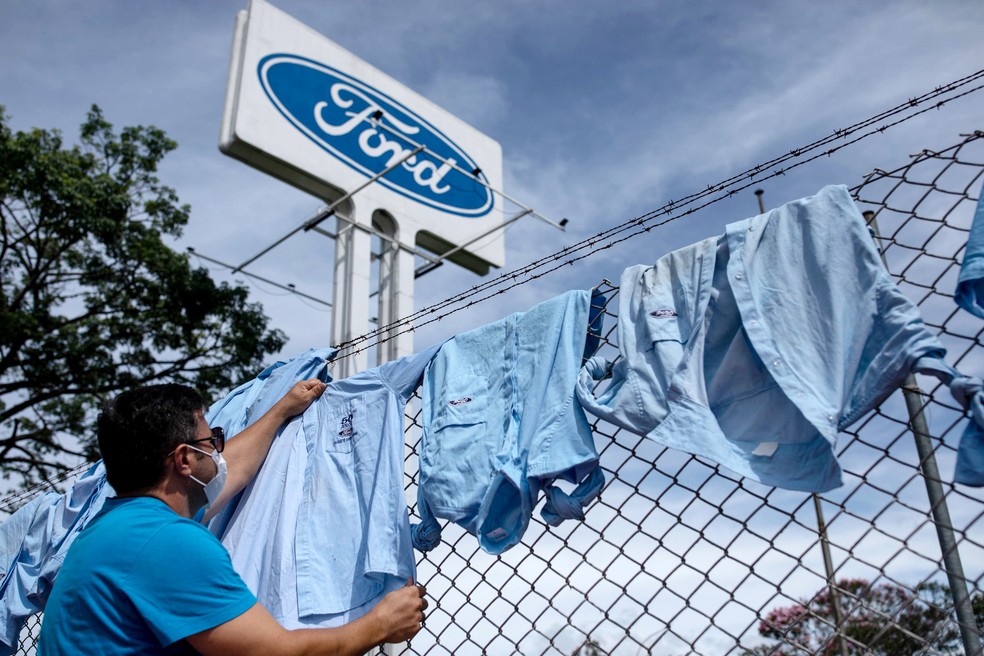RIO DE JANEIRO, BRAZIL – One year ago, on January 11, 2021, Ford announced the end of vehicle production in Brazil, surprising employees and customers. With more than a century of presence in the Brazilian market, the first automaker installed in the country claimed that the drastic decision was motivated by “years of significant losses”, making the local manufacturing operation unsustainable.
To close its plants in Camaçari (Bahia State) and Taubaté (São Paulo State) over the following months, the company had to spend a fortune on indemnities to thousands of employees and hundreds of dealers – not to mention the return of public funds, such as tax incentives and loans from state-owned banks.
Ford does not mention how much it spent in total to demobilize its manufacturing activities on Brazilian soil. However, soon after announcing the change of strategy, the company informed that it had allocated US$4.2 billion for this purpose. The amount corresponded to about R$22 billion at the beginning of last year and, at the current exchange rate, is equivalent to R$ 23.8 billion.

According to the unions consulted, the agreement of the blue oval brand defined a minimum payment of R$130,000 to each worker dismissed, including up to two additional salaries per worked year and additional for the length of service.
Responsible for producing engines and transmissions, the Taubaté plant had about 800 direct employees dismissed and extended its activities to produce spare parts until July last year.
The Camaçari unit, responsible for assembling Ka, Ka Sedan, and EcoSport, in addition to engine production, laid off about 4,000 employees and closed its doors last December.
In 2019, Ford had already closed the activities of the São Bernardo do Campo (São Paulo State) plant, retiring its truck line and decreeing the end of the line for the Fiesta.
RETURN OF BILLIONS IN PUBLIC MONEY
In July 2021, Ford paid R$2.14 billion to the government of Bahia. The amount, corrected, was provided for in an additive term of a contract signed by the parties in 2014 when Ford committed to invest in the Camaçari industrial complex through tax incentives to finance working capital granted by the state.
“With Ford’s decision to close the complex permanently, these benefits were the contractual parameter to set the amount of compensation owed by the company, plus monetary adjustment,” says a note sent by the Bahia government.
As of January 2021, the company also had two financing contracts with BNDES, signed in 2014 and 2017, totaling R$335 million – in addition to another 30 indirect financing contracts, amounting to R$54.2 million.
According to the public development bank, linked to the Ministry of Economy, the two direct loans have already been paid off by the company, while the indirect financing has been honored.
CONCESSIONAIRES CHARGED R$1.5 BILLION
After the announcement of the end of the national production, the dealer network, then with 283 units, started a tumultuous negotiation with Ford to deal with indemnities to dealers that would have their contracts terminated in the new phase – in which the blue oval would become only an importer of vehicles.
As reported by UOL Carros at the time, in January 2021, Abradif (Brazilian Association of Ford Dealers) rejected the initial proposal made by the company and demanded the immediate termination of all active contracts for subsequent hiring of dealers, who would effectively remain with the brand.
The demand for compensation exceeded R$1.5 billion – the value of the entire network, estimated by the association at the time.
Through correspondence addressed to Ford’s top management, Abradif alleged fear that the company would definitively leave the country within a few years and said that the respective revenue would plummet about 80% with the discontinuation of national models.
The entity also demanded the release of R$200 million from the FAV (Vehicle Acquisition Program), a fund controlled by the assembler and financed by its distributors to facilitate the purchase of Ford vehicles for resale to consumers, without interest and with a partial IOF subsidy.
Sought, Ford limited itself to informing that today its network has shrunk to 110 authorized distributors and that the negotiations are “practically finalized”.
The company refused to comment on the actual amount paid – Abradif, in turn, ignored the request for information made by the story.

